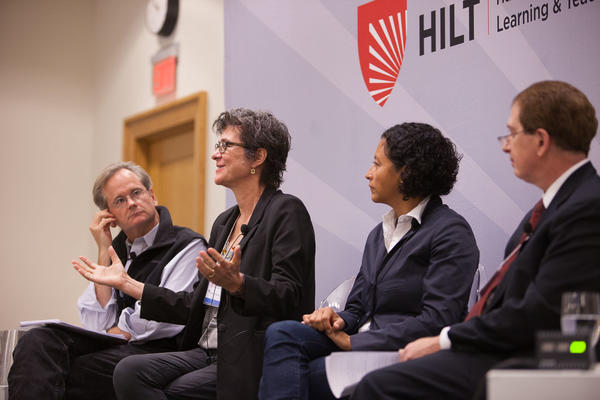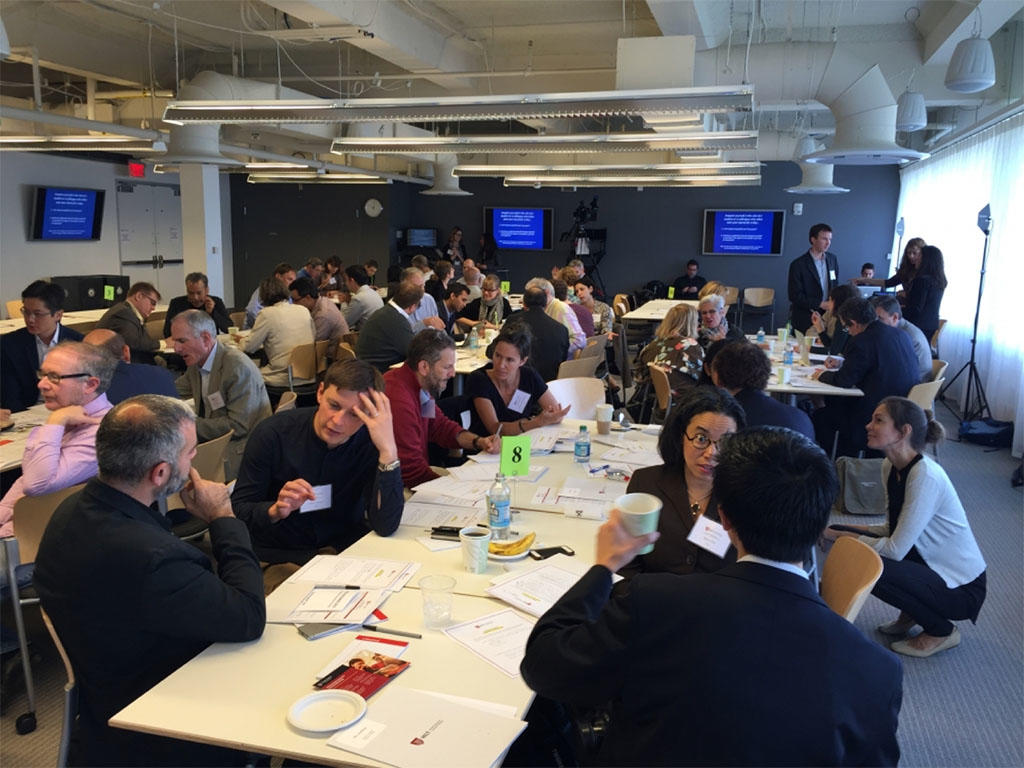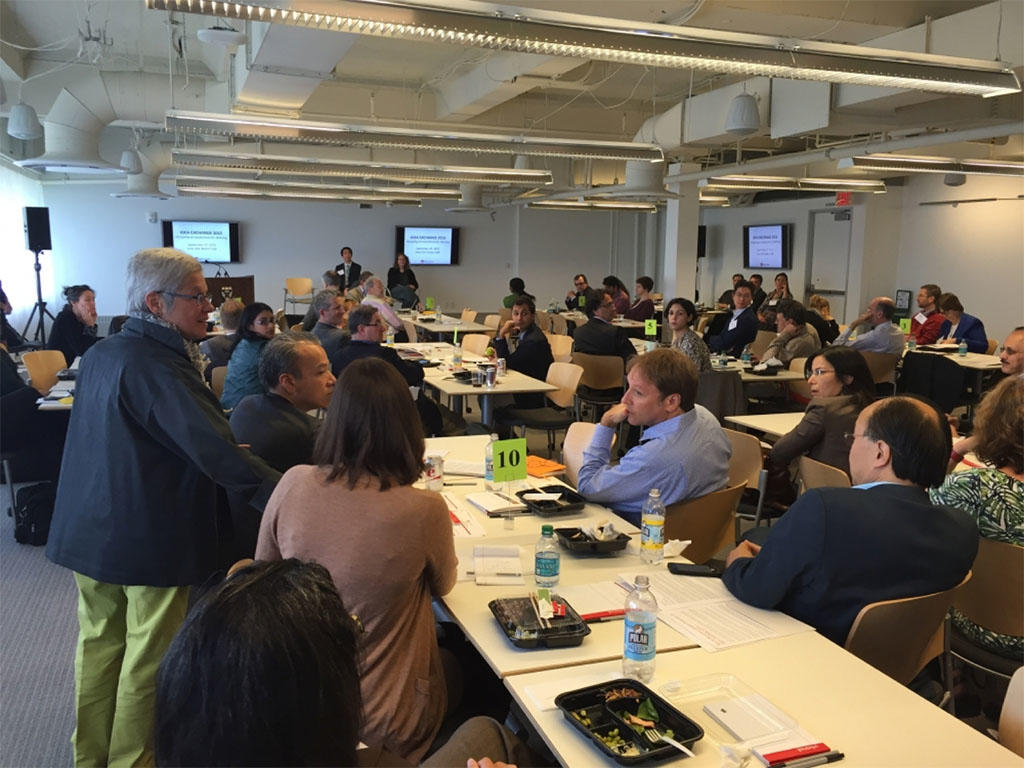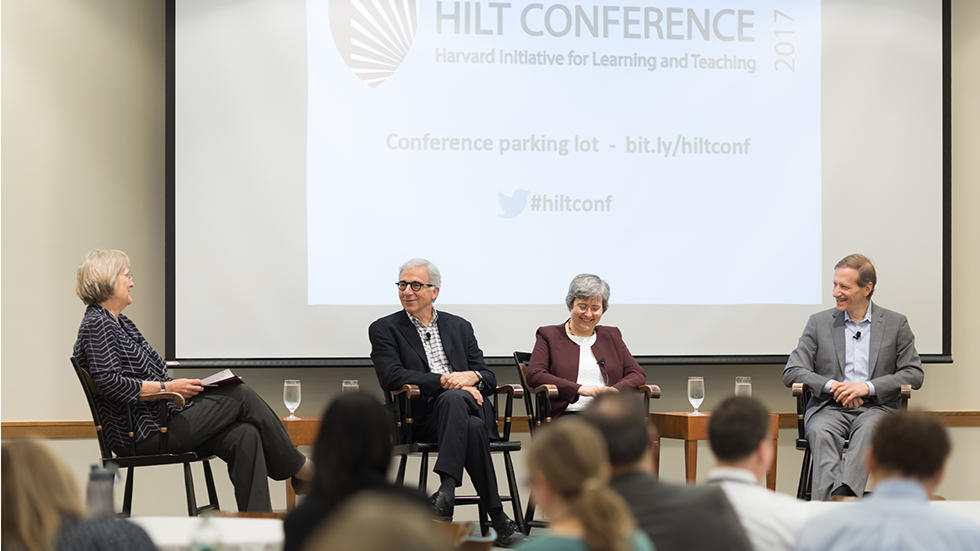2012-2017 Conferences
HILT’s annual conference builds upon those of prior years, aligning with the phasing of the 10-year initiative:

The inaugural HILT Symposium in February 2012 opened a Harvard-wide conversation, engaging over 300 faculty and students in dialogue, debate, and the sharing of ideas about pedagogical innovation. The event convened invited members of the Harvard community and presenters from within Harvard and externally who offered interesting and informative perspectives on teaching and learning in higher education, with an emphasis on evidence-based approaches.
This symposium was organized on behalf of President Faust by a University-wide collection of faculty, students, senior administrators and staff, and was supported by HILT. Its goals were to:
- Seed discussion about evidence-based innovation in education;
- Showcase novel, inventive, or canonically excellent approaches to teaching and learning;
- Forge connections across the University and beyond around teaching and learning.
For a brief glimpse of the proceedings from the 2012 HILT Symposium, watch this short video.
Date: Wednesday, May 8th
Location: Science Center (Plaza and Hall B)
Theme: "Essentials"
The 2nd annual conference hosted by the Harvard Initiative for Learning and Teaching focused on the framing question:
In this time of disruption and innovation for universities, what are the essentials of good teaching and learning?
Active engagement with focused, contrasting perspectives. In short (10-15 minute) presentations, speakers offered complementary and at times contradictory answers to the “essentials” question—for example, “perspective taking,” “effective studying,” “accountability,” “mastery,” “innovation,” and “preservation”—as well as concrete take-away recommendations. These presentations were structured as provocations for participants to reflect on their own answers to the framing question in a variety of ways. Each session included facilitated audience interaction.
Connect with colleagues from across the university. Instructors, students, and administrative leaders from all Harvard schools were invited to attend. One of our primary goals for the conference was to build community around teaching and learning, with opportunities for conference participants to interact substantively with each other across disciplinary and school perspectives.
Learn about innovative teaching and learning projects. Ongoing activities of first-year HILT Grant recipients were highlighted as well as other projects and programs supported by HILT over the past year. The structure and timing of the next round of the HILT Grant Program was also announced.
HILT Annual Conference 2014 Engagement and Distance
The HILT Annual Conference was held on Tuesday, September 16, 2014 in Wasserstein Hall. Thank you to those of you who joined us, both on campus and remotely!

Conference goals
- Promote dialogue across Harvard’s campuses about educational innovation, including constructive discussion of provocative, thoughtful, and contrasting perspectives.
- Provide examples of experimental approaches and research studies that generalize across academic fields, in particular those that help faculty think through how to experiment in their own teaching with the practical insights that come from those examples.
- Extend the network of Harvard scholars, instructors, senior leaders, academic professionals, and students who are improving educational practice.
Theme and motivating questions
The conference is designed around a motivating question, one that builds on the thematic questions from the two previous conferences:
2012: How can we catalyze and sustain evidence-based educational innovation?
2013: What are the essentials of good teaching and learning?
2014: How does distance affect student engagement?
Why this theme? There was a clear answer when we polled attendees about the question posed last year: the most essential aspect of good teaching and learning is student engagement. Many of the efforts underway within HarvardX, HILT, and at each Harvard school represent ways to try to understand what will keep students engaged enough to learn deeply. Engagement (and disengagement) can manifest in terms of attention, emotion, behavior (or lack of those). Our conference planning working group began to articulate a broad question: How does distance, all facets of distance – intellectual, spatial, temporal, psychological – influence student engagement?
We hope this motivating question will engender substantive discussion about the relationship between residential, online, and hybrid forms of teaching and learning (and the various groups on campus dedicated to those) and how to meet the challenges implicit in those relationships.
Designing an assessment for learning
The Harvard Initiative for Learning and Teaching Annual Conference was held on Friday, September 25th at Batten Hall. Thank you to those of you who were able to join us!
See the Resources tab for video and handouts from the day.

This year's event was constructed to build on prior themes, but reflect HILT's strategically phased approach to its work. Specifically, a shift from "launching and catalyzing" to "deepening and documenting" the impact of innovative teaching and learning.
With that goal in mind, HILT extended invitations to all tenured- and tenure-track faculty at Harvard, targeting those who are a) teaching a new course, b) overhauling an existing course, or c) new to the University.

The conference program highlighted a range of assessment examples across disciplines and provided the opportunity for faculty colleagues to work with one another to design personalized assessments for their own 2015-2016 courses.
HILT's fifth Annual Conference was held on Friday, September 30, 2016 in Wasserstein Hall. Thank you to those of you who joined us!
Provost, Alan Garber, moderates a lunch panel discussion featuring professors Danielle Allen and Ned Hall to speak to specific opportunities for teaching and learning improvement at Harvard University.
The 2016 HILT Conference showcased varied interactive instructional approaches and considerations for Harvard in an evolving education landscape.
HILT's sixth Annual Conference on "Evaluating teaching" was held on Wednesday, September 20, 2017 in Wasserstein Hall. Thank you to those of you who joined us to explore various facets of evaluating teaching effectiveness at Harvard and beyond that incorporate partnerships between academic professional staff and faculty toward improving teaching and learning.


